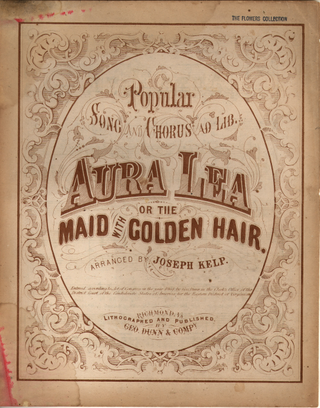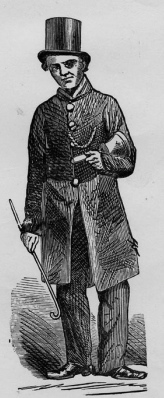
Music hall is a type of British theatrical entertainment that was most popular from the early Victorian era, beginning around 1850, through the Great War. It faded away after 1918 as the halls rebranded their entertainment as variety. Perceptions of a distinction in Britain between bold and scandalous music hall entertainment and subsequent, more respectable variety entertainment differ. Music hall involved a mixture of popular songs, comedy, speciality acts, and variety entertainment. The term is derived from a type of theatre or venue in which such entertainment took place. In North America vaudeville was in some ways analogous to British music hall, featuring rousing songs and comic acts.

"John Brown's Body", originally known as "John Brown's Song", is a United States marching song about the abolitionist John Brown. The song was popular in the Union during the American Civil War. The song arose out of the folk hymn tradition of the American camp meeting movement of the late 18th and early 19th century. According to an 1889 account, the original John Brown lyrics were a collective effort by a group of Union soldiers who were referring both to the famous John Brown and also, humorously, to a Sergeant John Brown of their own battalion. Various other authors have published additional verses or claimed credit for originating the John Brown lyrics and tune.

"Turkey in the Straw" is an American folk song that first gained popularity in the 19th century. Early versions of the song were titled "Zip Coon", which were first published around 1834 and performed in minstrel shows, with different people claiming authorship of the song. The melody of "Zip Coon" later became known as "Turkey in the Straw"; a song titled "Turkey in de Straw" with different music and lyrics was published in 1861 together with the wordless music of "Zip Coon" added at the end, and the title "Turkey in the Straw" then became linked to the tune of "Zip Coon".
"The Skye Boat Song" is a late 19th-century Scottish song adaptation of a Gaelic song composed c.1782 by William Ross, entitled Cuachag nan Craobh. In the original song, the composer laments to a cuckoo that his unrequited love, Lady Marion Ross, is rejecting him. The 19th century English lyrics instead evoked the journey of Prince Charles Edward Stuart from Benbecula to the Isle of Skye as he evaded capture by government soldiers after his defeat at the Battle of Culloden in 1746.
"Ar Hyd y Nos" is a Welsh song sung to a tune that was first recorded in Edward Jones' Musical and Poetical Relics of the Welsh Bards (1784). The most commonly sung Welsh lyrics were written by John Ceiriog Hughes (1832-1887), and have been translated into several languages, including English and Breton. One of the earliest English versions, to different Welsh lyrics by one John Jones, was by Thomas Oliphant in 1862.
"Blaydon Races" is a Geordie folk song of 1862, with lyrics by George Ridley written in a style deriving from music hall. It celebrates the horse races held at Blaydon in North East England that year, although mostly composed in advance of the event. The words were inspired by the American ballad "On the Road to Brighton", to the tune of which they are set. The song has become a local anthem, and is frequently sung by supporters of Newcastle United Football Club, Newcastle Falcons rugby club, and Durham County Cricket Club.

"Aura Lea" is an American Civil War song about a maiden. It was written by W. W. Fosdick (lyrics) and George R. Poulton (music). The melody was used in Elvis Presley's 1956 hit song "Love Me Tender".
"Streets of Laredo", also known as "The Dying Cowboy", is a famous American cowboy ballad in which a dying ranger tells his story to another cowboy. Members of the Western Writers of America chose it as one of the Top 100 Western songs of all time.
"The Wearing of the Green" is an Irish street ballad lamenting the repression of supporters of the Irish Rebellion of 1798. It is to an old Irish air, and many versions of the lyric exist, the best-known being by Dion Boucicault. The song proclaims that "they are hanging men and women for the wearing of the green".
"Early One Morning" is an English folk song with lyrics first found in publications as far back as 1787. A broadside ballad sheet in the Bodleian Library, Oxford, dated between 1828 and 1829 has the title "The Lamenting Maid" and refers to the lover leaving to become a sailor.

"The Bonnie Banks o' Loch Lomond" is a traditional Scottish folk song. Its origins are thought to date to the Jacobite rising of 1745.
"I'm Alabama Bound" is a ragtime melody composed by Robert Hoffman in 1909. Hoffman dedicated it to an M. T. Scarlata. The cover of its first edition, published by Robert Ebberman, New Orleans, 1909, advertises the music as "Also Known As The Alabama Blues" which has led some to suspect it of being one of the first blues songs. However, as written, it is an up-tempo rag with no associated lyrics. The song has been recorded numerous times in different styles—both written and in sound recordings—with a number of different sets of lyrics.
"Poor Paddy Works on the Railway" is a popular Irish folk and American folk song. Historically, it was often sung as a sea shanty. The song portrays an Irish worker working on a railroad.
"The Rattlin' Bog" is an Irish folk song. It is a version of an internationally distributed folk song type. In the Roud Folk Song Index it has the number 129, and carries such titles as "The Everlasting Circle", "The Tree on the Hill", "The Green Grass Grew All Around", and "Down in the Lowlands", as well as "The Rattlin' Bog", The adjective rattlin' means "splendid" in the context of this song. It is a cumulative song, similar to "The Twelve Days of Christmas", as it has a list at the end of each verse which grows throughout the piece. The Roud index lists 180 versions collected from oral tradition in English, and the song has analogues in French, Italian and German as well. Since it is a folk song, it has been transmitted over generations orally and aurally so many versions coexist and it may be impossible and even nonsensical to seek a single authoritative version of the song's lyrics. The earliest version appears to be "March to the Battlefield" in "Riley's Flute Melodies" published by Edward Riley. In 1877, water-colour painter and folk-song collector Miss Marianne Harriet Mason published a version called "Green Grass Grows all Around" in "Nursery Rhymes and Country Songs".

George "Geordie" Ridley (1835–1864) was a Tyneside concert hall songwriter and performer in the middle of the 19th century. His most famous song is "Blaydon Races". He was a contemporary of Edward Corvan. He has been described by a council source as a candidate for Tyneside's most famous songwriter.
"The Keel Row" is a traditional Tyneside folk song evoking the life and work of the keelmen of Newcastle upon Tyne. A closely related song was first published in a Scottish collection of the 1770s, but may be considerably older, and it is unclear whether the tune is Scottish or English in origin.
"Cushie Butterfield" is a famous Geordie folk song written in the 19th century by Geordie Ridley, in the style of the music hall popular in the day. It is regarded by many as the second unofficial anthem of Tyneside after Blaydon Races.
Joe Wilson was a Tyneside concert hall songwriter and performer in the mid-19th century. His most famous song is "Keep yor feet still Geordie hinny". He was a contemporary of George "Geordie" Ridley. He wrote and sang in the Geordie dialect of Newcastle upon Tyne, his native speech.

Allan's Illustrated Edition of Tyneside Songs and Readings... is an historic book of Tyneside popular and traditional songs that consisted, in its final published form, of a compilation of approximately 400 song lyrics and notes, with added songwriter and subject biographies and geographical details, together spanning over 600 pages. It was reprinted in 1972 by Frank Graham, Newcastle upon Tyne, with an introduction by music scholar David Harker.

Henry Robert Clifton was an English music hall singer, songwriter and entertainer. A prolific composer in the popular genre, his most successful song was "Pretty Polly Perkins of Paddington Green".







